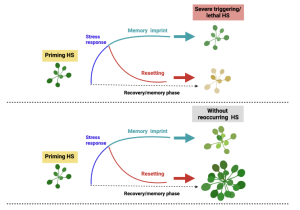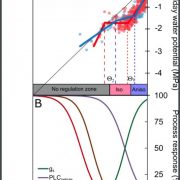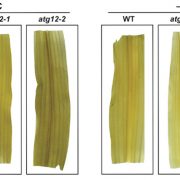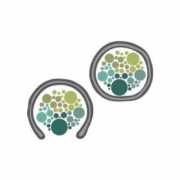Review. Autophagy: A key player in the recovery of plants from heat stress
 Plants have a remarkable ability to adapt to stress. For many stresses, plants respond to short-term mild exposure by becoming more tolerant to subsequent harsher stresses that would otherwise be lethal; this effect is known as priming. Priming occurs through several mechanisms that can include changes to metabolism, accumulation of transcription factors or miRNAs, and epigenetic changes to chromatin. What is less well understood is how plants reset, which is the topic of this review by Sedaghatmehr and Balazadeh. Although the state of being primed can prevent death, it is often accompanied by a reduced growth rate. Therefore, at some point the plant needs to reset to pre-primed state, a process that involves autophagy. Autophagy is a complex set of pathways that lead to the degradation of cytoplasmic constituents and organelles, and so has been widely studied during senescence or periods of starvation. Autophagy is also induced following heat stress and during recovery; furthermore, autophagy mutants show decreased thermotolerance. As global temperatures continue to rise, a better understanding of how plants tolerate and recover from heat stress is needed. (Summary by Mary Williams @PlantTeaching) J. Exp. Bot 10.1093/jxb/erae018
Plants have a remarkable ability to adapt to stress. For many stresses, plants respond to short-term mild exposure by becoming more tolerant to subsequent harsher stresses that would otherwise be lethal; this effect is known as priming. Priming occurs through several mechanisms that can include changes to metabolism, accumulation of transcription factors or miRNAs, and epigenetic changes to chromatin. What is less well understood is how plants reset, which is the topic of this review by Sedaghatmehr and Balazadeh. Although the state of being primed can prevent death, it is often accompanied by a reduced growth rate. Therefore, at some point the plant needs to reset to pre-primed state, a process that involves autophagy. Autophagy is a complex set of pathways that lead to the degradation of cytoplasmic constituents and organelles, and so has been widely studied during senescence or periods of starvation. Autophagy is also induced following heat stress and during recovery; furthermore, autophagy mutants show decreased thermotolerance. As global temperatures continue to rise, a better understanding of how plants tolerate and recover from heat stress is needed. (Summary by Mary Williams @PlantTeaching) J. Exp. Bot 10.1093/jxb/erae018









